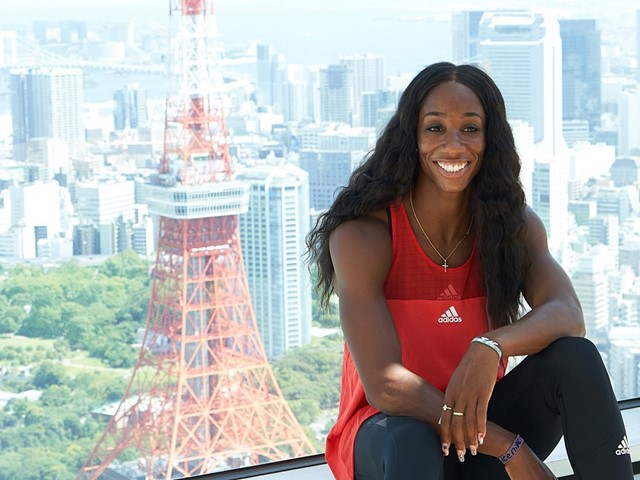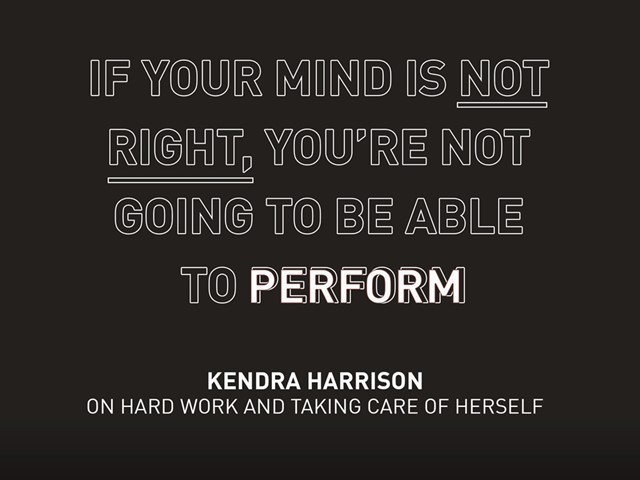Through our “In Their Words” series, we have been catching up with athletes that are leading their sports, to discuss their experience taking part in the games that almost didn’t happen. In this piece, Olympic hurdler Kendra Harrison talks through her support system through her first Games and Silver medal as well as how she takes care for herself through all the pressure.
You’re an Olympic silver medalist, how does that title feel?
I feel really good, knowing that I came here and performed well on the big stage. I’ve struggled with that in the past and knowing that I finally came here and did well, got the results of all the hard work that I’ve been putting in, I have something to show for it now.
These were your first Olympics game; how did that feel coming here and achieving those dreams? Becoming an Olympian?
I feel great being here as a first time Olympian and having a medal to bring back to my family and friends. You work so hard for such a couple seconds on the track and to have something to show for it is very great. It makes it worth it.
The journey to Tokyo has been an unusual one for everyone, how was your experience?
I think during the pandemic, I took that time to work on the smaller things that I normally don’t get to do in the season. Just working on my sprint mechanics, my technique. So, I think that time actually made me a better athlete, is how I like to look at it. I just try to look on the brighter side and be patient and know that the opportunity is going to come again and keep a positive attitude.

Did your training routine change a lot during the pandemic?
We were able to find a track, there’s a lot of tracks where I live in in Austin Texas, so we would train in one track then get kicked off, and just go to another one. And then we ended up finding out that one of the tracks is going to be open the entire time. So I was just grateful that I was able to stay fit to continue to be able to have that time to train, because I know that some athletes literally couldn’t leave their houses. It was nice to be able to get out of the house and just train for a couple hours and then go back. It’s kind of how I stayed sane, knowing that I had practice to look forward to.
How do you overcome barriers and challenges that were in front of you?
I know that things happen that are out of our control, whether you hit a hurdle, whether you fall down, whether you run back, whatever that negative thing is that just happens, the biggest thing is being able to get back up, being able to realize this is not what you wanted and get back out after it again, never giving up. I think that’s something that I am a big example of, somebody who is always trying, you know if I fall down, I get back up and it makes me a stronger and better athlete because of that, being able to deal with adversity. I think that’s really how I become better.
A lot conversation lately have been around athlete mental health, what are some things you go through in terms of the preparations you have or little techniques to take care of your wellbeing?
As an athlete mental health is very important, I realized in 2017 that I needed to talk to somebody, for me to talk to a sport psychiatrist wasn’t really common, but I realized that I needed it and I feel like I’ve become a better athlete because of it. I feel like I’ve been able to sit down and talk to somebody about things I struggle with. You know if your mind is not right you’re not going to be able to perform, and I knew that. If you’re not healthy up top, physically it doesn’t matter.
I feel like a lot of times fans and people who don’t really understand athletes see you out there but they don’t see what you’re actually going through and that can be a lot sometimes, so just finding outlets that athletes can talk to, somebody that can help that’s how great performances come.

You have a big family and friends; can you talk a little more about your support group?
My supportive group, my Keni Krew group, they mean a lot to me, the just want the best for me, and to have them there and to realize that I need to lean on them in certain times and to know that they’re always there for me whenever I need them, at the end of the day they just want to help me be successful and help me. Having my best friend as my neighbor is just so nice, because you can talk to somebody who is literally doing the same thing.
My family they just know how much I love track and field, if I’m running in the States they’re going to be there you know, so just seeing them means a lot. They were there at the Olympic Trials, they surprised me, I had no idea that so many of them were going to come, and suddenly I saw them all there, I was warming up and I looked up and I kept going is that my sister? is that my brother? They wanted to surprise me after the race, but I ended up seeing them, and I was going into the final thinking alright everybody is here, let’s do this for real, everybody is here that you love.
In contrast to that experience, how was it in Tokyo, obviously family and friends couldn’t be there?
Thank goodness for facetime, it was tough because everybody wanted to be here if it was allowed, but I just knew that back home they were doing the best that they could watching every single round and cheering for me and sending me positive and good luck messages. Just seeing all that through the technologies we had so that I was able to stay connected with them.
Of course, when I crossed the line, I wanted to look up and see my family, but this is my first Olympics so I can’t really base it off the other ones like everyone else can.
Is there one person on your mind that you are thankful for?
My coach, having him here, and he’s known the journey that we’ve been on together, like missing out on the Olympic team in 2016, he stood by my side, and we always said we’re going to work hard and get back at it again. And so, to finally make this one and bring that hardware, I know he felt so great to see me achieve all that hard work we put in together, like he was upset of course in 2016 when I didn’t make it, but he stuck by my side and that means all the world to me. He was like if you are winning, I’m winning, if we are losing, we are losing together, you don’t see that often in coach and athlete relationships.
Finally, my older sister Casey, she does a lot for me, and she never wants me to worry about things that I don’t have to worry about. She’s the one that found and got me a house in Texas when I was abroad competing. She just wants to help me any way that she can. So, I called her, she was the first person I called after my race, and I knew she was going to stay up and she wasn’t going to sleep, because she was like I can’t even eat anything, it was like 2am 3am over there.
Last Question, is there any advice you want to give to the next generation of track and field athletes?
Always work hard, because when you work hard you will reap the benefits of it. As an athlete whose career has been up and down, I’m here and I got a silver because of the work that I put in, never giving up on myself, believing in myself, being confident in myself.
After not making the team in 2016, two weeks later I broke the world record, the ability was always there, it’s not like I just transformed into a new athlete. I think that world record came because of so much emotion, I don’t think if I had gone to Rio, I would’ve broken the record, I had to dig deep for that, so I don’t think I would change that timeline the way things happened. But having a world record you want to call yourself an Olympian too and so to finally call myself an Olympian and to have a medal on top of that is everything.

